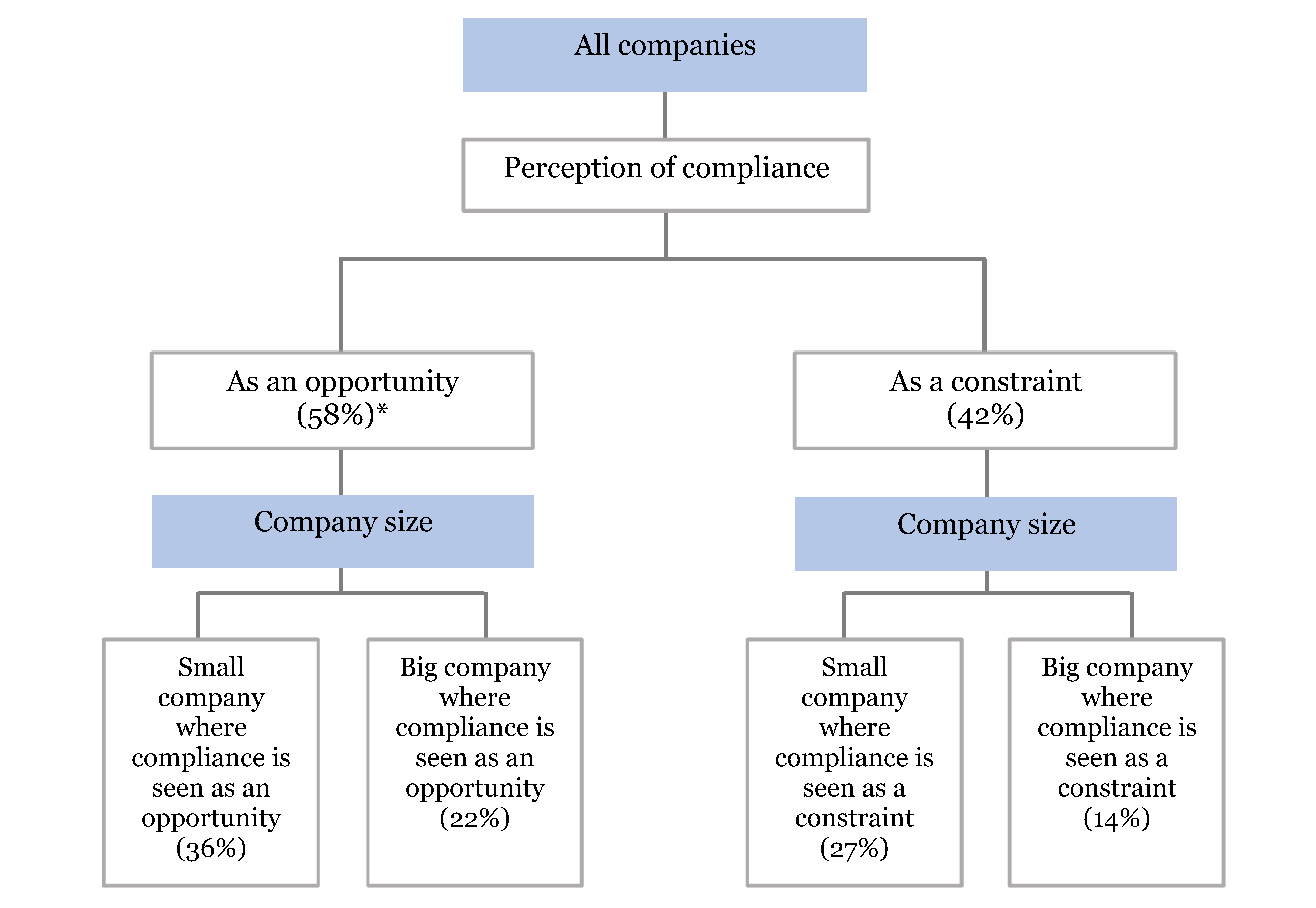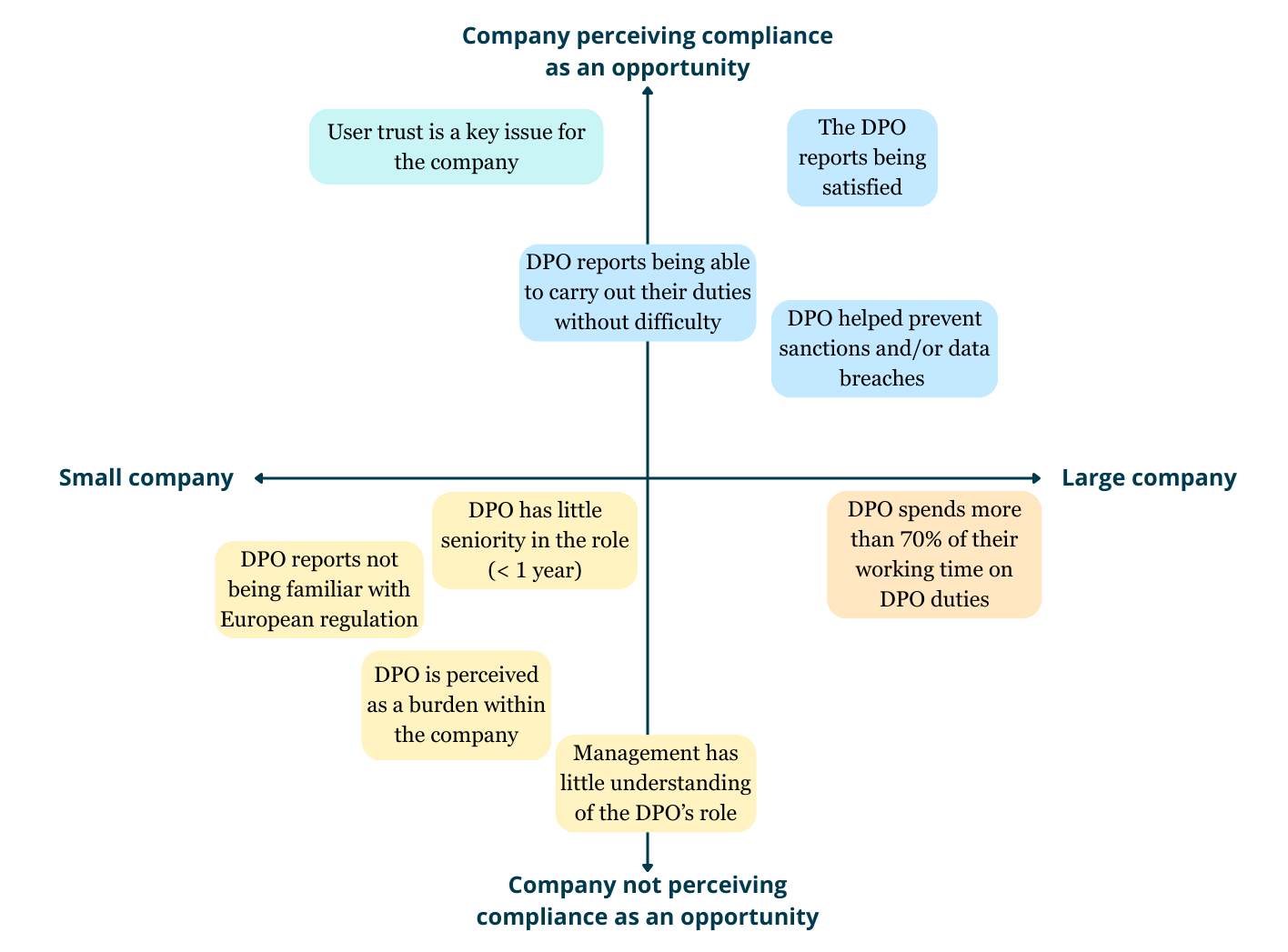What are the economic benefits of having a DPO for a company?
08 September 2025
The CNIL has studied the economic benefits due to the presence of a Data Protection Officer (DPO) within a company. The analysis shows that this role is often profitable, particularly for companies adopting a positive approach to GDPR compliance.

At the request of the French Ministry of Labor, Employment and Health, the Association for Adult Vocational Training (AFPA) carried out the fourth edition of its statistical survey on Data Protection Officers (DPOs) in January 2024. With 3,625 respondents, this questionnaire makes it possible to study the economic benefits for a company related to the presence of a DPO, regardless of whether their appointment is mandatory.
In addition to this study, the CNIL conducted qualitative interviews with ten DPOs put forward by the French Association of Data Protection Officers (AFCDP). These interviews helped confirm the interpretation of the survey results.
The economic benefits of the DPO
Responses to the questionnaire show that different types of benefits are linked to the role of the DPO as a leverage for winning tenders, protection from fines, avoiding data breaches, and streamlining data management. However, not all companies with DPOs perceive these benefits.
The statistical analysis shows that these benefits are more likely to be perceived by larger companies and those most invested in GDPR compliance, meaning companies that perceive compliance as an opportunity rather than as a constraint.

* Share of the company group within all companies
Sources: AFPA survey, modelling and CNIL calculations
36% of DPOs work in a small company where compliance is perceived as an opportunity: this is the largest group among all the companies surveyed. Overall, 58% of DPOs are in organizations with a positive stance on compliance. The analysis does not show a clear link between company size and perception of compliance. The two most represented sectors are “Research, IT and consulting” and “Banking, insurance and mutuals” with 24% and 17% of the DPOs in the sample, respectively.
The benefit of compliance as leverage in tenders
The presence of a DPO is an important trust signal in tendering procedures, especially when personal data processing is involved. Having a DPO demonstrates that candidates take compliance issues into account. For the buyer, the DPO is also a valuable contact point throughout service execution (processing documentation, drafting subcontracting clauses, advisory role, etc.).
One DPO noted that after implementing a compliance-focused strategy, their company’s chances of winning tenders increased by half. 42% of DPOs surveyed also reported perceiving this benefit, and this rises to 50% among those regularly consulted.
Interviews also revealed that some DPOs see their role as extending beyond mere compliance with data processing requirements. They also create value from compliance, for instance, by embedding GDPR compliance into the company’s CSR strategy.
The benefit of avoiding sanctions
Fines imposed by data protection authorities can be significant. In 2024 alone, CNIL issued 87 fines totalling €55 million.
Statistical analysis shows that the benefit of avoiding sanctions, as perceived by DPOs, depends on company size and business model.
Companies whose business model relies partly or wholly on data, or on the marketing of potentially intrusive innovative solutions, see major benefits in avoiding sanctions. For them, it is not so much the monetary cost of the fine that is feared, but the effect on the company’s reputation with clients and partners. In companies where brand image is incompatible with GDPR non-compliance, DPOs report playing an essential role in protecting corporate reputation.
Several DPOs stressed during interviews that sanctions could negatively impact revenues as well as financial ratings. Therefore, compliance has positive implications for both production cycle and financing capacity.
Through their roles of informing, raising awareness, advising, and monitoring, DPOs help prevent sanction risks as they assist organizations in achieving compliance and meeting their obligations. The DPO is also the point of contact for the supervisory authority and for individuals whose data are processed. As such, the DPO may oversee the organization of responses to data subject rights requests, ensuring complete responses are given within legal deadlines.
The benefit of avoiding data breaches
Cyberattacks represent significant costs for companies. For instance, IBM reported in 2024 that the average cost of a data breach reached $5 million, a 10% increase compared to 2023.
As with public sanctions, companies whose business model depends heavily on data face reputational damage in the event of a large-scale data breach. Economic research in cybersecurity shows that major breaches can cause stock prices of large companies to drop significantly.
The DPO can help reduce the risk of data breaches. Due to their various responsibilities, DPOs play a central role in securing personal data within the company. They advise on security measures to implement, take part in privacy impact assessments, conduct audits, and alert management to identified vulnerabilities. They also contribute to drafting security policies and organize awareness and training sessions for employees.
In CNIL interviews, one DPO reported that after implementing phishing awareness training, the click rate on suspicious links in their company dropped from 21% to 5%.
The benefit of streamlining data management
The GDPR’s guiding principles (purpose limitation, data minimization, storage limitation), whose respect is assured by DPOs, encourage companies to be cautious in collecting and retaining personal data.
This streamlining of data management has several economic benefits. On one hand, it results in operational savings in storage costs. For example, a DPO from a company with €150 million in revenue explained that GDPR compliance saved €400,000 in server costs. On the other hand, it also improves cybersecurity: fewer collected and stored data means fewer entry points for cybercriminals and therefore a reduced attack surface.
On a broader scale, the DPOs contribute to improve knowledge of the company’s data assets. By eliminating data silos and duplication, they make it easier for teams to access the right data, improving internal efficiency and decision-making.

Sources : AFPA survey, CNIL modeling and calculations
The chart above illustrates the key insights from the Principal Component Analysis (PCA), which was carried out based on responses to the questionnaire. This analysis summarizes the answers along two main axes: one reflecting company size, and the other reflecting how compliance is perceived. Elements positioned to the right correspond to larger organizations. For example, DPOs spending more than 70% of their time on their role typically work in a large company. At the top of the chart, responses are associated with a positive view of compliance: DPOs who report being able to fully perform their duties are most often employed in organizations where compliance is seen as an opportunity.
This chart highlights some of the most notable results from the questionnaire. For instance, DPOs are more likely to state that they can prevent sanctions and data breaches when they work in larger organizations, but also in those that adopt a positive approach to compliance.
The Impact of business models on the DPO
The economic benefits a DPO brings can be larger or smaller depending on the company’s business model. The reverse is also true: DPO working conditions vary depending on company size, business model, and perception of compliance.
The study shows that companies most invested in compliance allocate more resources to their DPOs. This is why DPOs can be seen as an investment: companies that dedicate resources to DPOs are those that reap the most benefits. These tend to be companies perceiving the risk of CNIL sanctions as high, as well as companies whose business models rely heavily on data.
There is a return on investment in the sense that DPOs who have more time to devote to their role are better able to ensure compliance, thereby reducing sanction risk.
Beyond resources, investment in compliance also affects how DPOs perceive their role. DPOs who struggle to carry out their tasks, who are rarely consulted, and receive little training, tend to be less satisfied at work. In those companies, compliance is seen more as a regulatory burden rather than an economic opportunity, and consequently the DPO’s role is perceived as less valuable.
By contrast DPOs in organizations perceiving GDPR compliance as an opportunity tend to be more satisfied.
Conclusion: Compliance as a business asset
GDPR compliance is mandatory and inevitably comes with compliance costs. However, companies can offset these costs by leveraging compliance a business asset.
Article 37 GDPR outlines cases where companies must appoint a DPO, which leads some organizations to perceive the DPO as a constraint.
However, there are economic gains from GDPR compliance that can be obtained through the DPO when compliance is treated as an asset playing a full role in the business model. The investment made can generate economic returns: it is a true asset from an economic point of view.
Since GDPR compliance is part of a CSR strategy, a parallel can be drawn with environmental issues, where the distinction between companies that view regulation as a burden and those that see it as an opportunity is also clear.
In this approach, the DPO is not just a cost but can create value and thus become a profitable investment for the company.
Recommendations for companies
Adopting the following practices can help maximize the economic value of a DPO:
- Include DPOs in executive committee meetings so compliance can be integrated with overall strategy.
- Align GDPR compliance with CSR and IT security strategies for consistent planning and operations.
- Measure and communicate economic benefits of the DPO role, at least informally, through internal discussions and coordination with other departments or management control.
- Raise awareness across departments so that compliance is recognized as a source of value, and the DPO’s work is aligned with business goals.
Methodology
The statistical analysis relies in particular on the principal component analysis (PCA) method, which summarizes information from a large number of responses. This method facilitates understanding of observed phenomena by identifying the two most relevant dimensions in how DPO responses are organized. Here, the responses vary mainly according to company size and to the level of investment in compliance.



